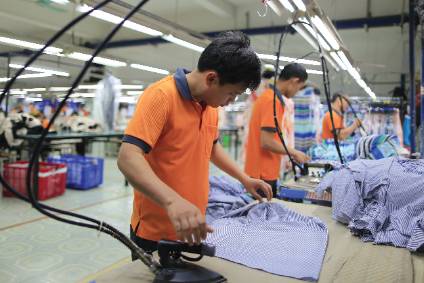
The European Union (EU) and Better Work this week announced progress of their joint efforts to improve garment industry working conditions in countries such as Bangladesh and Vietnam.
In late 2019, the EU joined Better Work – an initiative between the International Labour Organization (ILO) and the International Finance Corporation (IFC), a member of the World Bank Group – as a new donor in addition to Australia, Denmark, Germany, Switzerland, the Netherlands and the United States. Along with other donors, the EU supports Better Work in accelerating improvements in garment industry working conditions and to achieve more sustainable production patterns.
Achievements of the partnership so far include evolving factory services in the face of Covid-19, including ongoing assessments of working conditions in areas such as health and safety, gender equality, wages and overtime; as well as advisory and training services which focus on worker-management dialogue, gender equity, leadership skills, and cultivation of continuous learning.
In the context of the Covid-19, financial and human resources have been redirected towards helping factories reopen under new health and safety guidelines, partnering on health and safety awareness campaigns, and working closely with national governments, employers and workers on industry-wide responses to rebuild a more resilient garment sector.
The garment industry reported catastrophic losses due to the pandemic in the first half of 2020. Only three in five workers returned to factory jobs, and women have been disproportionately affected.
Better Work has supported factories as they reopen under new health and safety guidelines, developed virtual factory engagement services to continue to monitor working conditions during the pandemic and worked with industry partners to address practical and policy changes.

US Tariffs are shifting - will you react or anticipate?
Don’t let policy changes catch you off guard. Stay proactive with real-time data and expert analysis.
By GlobalDataSupporting the recovery of the garment industry “is a priority for us, given the strong development impact of the sector in terms of quality jobs, particularly for women and young people,” says Ousseynou Nakoulima, IFC Western Europe director.
Marjeta Jager, deputy director general for the Department for International Partnerships (DG INTPA), at the European Commission (EC) adds: “In many factories across the world, the garment industry is helping people, especially women who represent 80% of the garment workforce, to get a decent job, a living wage and social protection. Better Work plays an important role in those improvements.”
Better Work brings all levels of the garment industry together to improve working conditions and boost the competitiveness of apparel businesses. It is active in nine countries reaching more than 2m workers, including Bangladesh, Cambodia, Egypt, Haiti, Indonesia, Jordan, Nicaragua, Vietnam and Ethiopia.
Martha Newton, ILO deputy DG of Policy, notes: “Throughout 2020, Better Work supported hundreds of factories to implement Covid safe working practises. The programme devised new ways to communicate with workers, supported measures to address their concerns, and became a conduit for sharing the ILO’s policy advice on issues confronting employers and workers as the pandemic took its very destructive and unpredictable path.
“Better Work will be at the forefront of the ILO’s efforts to support a more equitable, resilient and sustainable garment industry.”



